Blog
VdB 123 is a reflection nebula in the constellation Serpens (Serpens Cauda). It is illuminated by the 9.75 mag. star HD 170634, from spectral class B7V. The nebula is embedded in a dark molecular cloud known as Serpens Cloud. This super dust cloud overlies a rich star field of the Milky Way and has an appearence like a fine blue mist with defined borders and thickenings in the middle. The lasts appear as dark nebulae and are catalogued in the Dobashi catalogue (Dobashi et al. 2005). Many other objects also can be seen on this image (see mouseover). Among them are some Herbig – Haro objects.
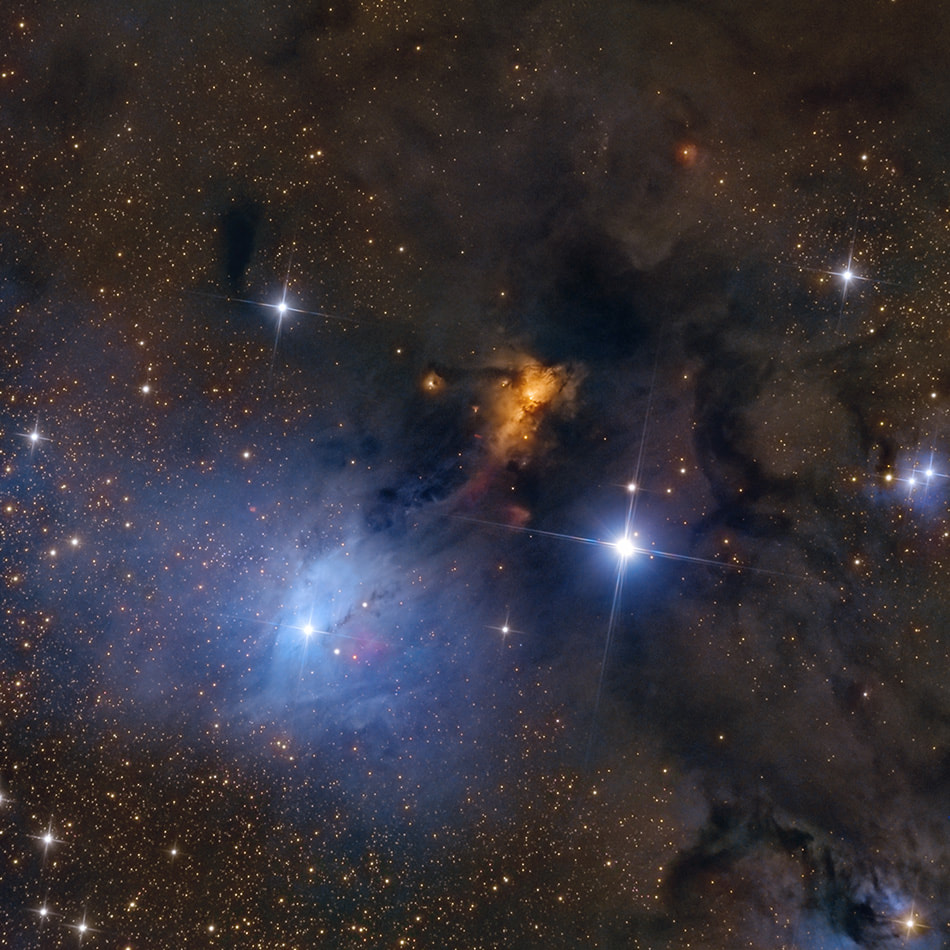
Nathaniel “Nat” Adderley Jr. (born May 23, 1955) is an American pop and rhythm and blues music arranger and pianist who spent much of his music career arranging as music director for Luther Vandross tours and contributed as co-songwriter on most of Vandross’s albums. His father Nat Adderley(1931–2000) was a composer and jazz cornet and trumpet player, while his uncle Cannonball Adderley (1928–1975) was a jazz alto saxophonist. Nat Adderley Jr. was born in Quincy, Florida on May 23, 1955. The scion of a famed jazz family, he grew up in Teaneck, New Jersey, moving to that suburban New York City community with his family when he was five years old. He started playing piano as a child and had his first song, “I’m on My Way”, recorded by his uncle Cannonball on the 1967 album Why Am I Treated So Bad! by the Cannonball Adderley Quintet when the young Nat Adderley was only 11 years old. While at the Fiorello H. LaGuardia High School of Music & Art and Performing Arts in New York City, Adderley first met Luther Vandross, who attended Taft High School in the Bronx. Adderley would end up spending much of his musical career with Vandross. He attended Yale University, graduating with a degree in African American studies.
While living in Houston, Texas, he was the music arranger for the 1981 album Never Too Much which became Vandross’s first hit with the title track, which reached number 33 on the Billboard Hot 100 and fourth on the dance charts. He continued working with Vandross, whom he called “a hilarious guy, a great employer, a great friend, and an incredible musician”, until the singer’s stroke in February 2003 that effectively ended his career.
Adderley has returned to his jazz roots, performing his own works, as well as tributes to both his father and uncle. He cites his influences as Chick Corea, John Coltrane and Thelonious Monk. In a 2009 interview with the Star-Ledger he said pianists “who are killing me” include Kenny Barron, Herbie Hancock, Cedar Walton and Joe Zawinul. As of 2009, Nat Adderley Jr is a resident of West Orange, New Jersey
more...Donald Moye, Jr. (born May 23, 1946), known as Famoudou Don Moye, is an American jazz percussionist and drummer. He is most known for his involvement with the Art Ensemble of Chicago and is noted for his mastery of African and Caribbean percussion instruments and rhythmic techniques.
Moye was born in Rochester, New York and performed in various drum and bugle corps (including the Rochester Crusaders) during his youth, as well as church choir. Moye has commented that he really “didn’t have an affinity for the bugle … and just kind of gravitated towards drums.” He also took violin lessons during this time. Moye was exposed to jazz at an early age since his mother worked for a local social club that had a jazz club next door that hosted musicians such as Kenny Burrell and Jimmy McGriff. His family was also musically inclined; his uncles played saxophones and his father played drums. Also, his mother used to take him to various performances as a child, such as “opera under the stars” and to see Mahalia Jackson.
more...Robert Arthur Moog (/moʊɡ/ MOHG; May 23, 1934 – August 21, 2005 NY, NY) was an American engineering physicist and pioneer of electronic music. He was the founder of Moog Music and the inventor of the first commercial synthesizer, the Moog synthesizer, debuted in 1964. This was followed in 1970 by a more portable model, the Minimoog, described as the most famous and influential synthesizer in history.
Moog created fundamental synthesizer concepts such as the pitch wheel, modularity, envelope generation, and voltage control. He is credited for helping bring synthesizers to a wider audience and influencing the development of popular music. His only patent was on his filter design; commentators have speculated that he would have become extremely wealthy had he patented his other innovations, but that their availability in the public domain helped the synthesizer industry flourish.
In 1971, Moog sold Moog Music to Norlin Musical Instruments, where he remained as a designer until 1977. In 1978, he founded the company Big Briar, and in 2002 renamed it Moog Music after buying back the rights to the name. In later years, Moog taught at the University of North Carolina at Asheville, and worked on designs for further instruments.
more...Alicia de Larrocha y de la Calle (23 May 1923 – 25 September 2009) was a Spanish pianist and composer. She was considered one of the great piano legends of the 20th century. Reuters called her “the greatest Spanish pianist in history” Time “one of the world’s most outstanding pianists”, and The Guardian “the leading Spanish pianist of her time”.
She won multiple Grammy Awards and a Prince of Asturias Award for the Arts. She is credited with bringing greater popularity to the compositions of Isaac Albéniz and Enrique Granados. In 1995, she became the first Spanish artist to win the UNESCO Prize.
Alicia de Larrocha was born in Barcelona, Catalonia, Spain. She began studying piano with Frank Marshall at the age of three. Both her parents were pianists and she was also the niece of pianists. Beginning her career at the age of three, she gave her first public performance at the age of five at the International Exposition in Barcelona. She performed her first concert at the age of six at the World’s Fair in Seville in 1929, and had her orchestral debut at the age of 11. By 1943, her performances were selling out in Spain. She began touring internationally in 1947, and in 1954 toured North America with the Los Angeles Philharmonic. In 1966, she engaged in a first strenuous tour of Southern Africa which proved so wildly popular that three further tours were completed In 1969, de Larrocha performed in Boston for the Peabody Mason Concert series.
more...Artie Shaw (born Arthur Jacob Arshawsky; May 23, 1910 – December 30, 2004 NY, NY) was an American clarinetist, composer, bandleader, actor and author of both fiction and non-fiction.
Widely regarded as “one of jazz’s finest clarinetists”, Shaw led one of the United States’ most popular big bands in the late 1930s through the early 1940s. Though he had numerous hit records, he was perhaps best known for his 1938 recording of Cole Porter‘s “Begin the Beguine.” Before the release of “Beguine,” Shaw and his fledgling band had languished in relative obscurity for over two years and, after its release, he became a major pop artist within short order. The record eventually became one of the era’s defining recordings. Musically restless, Shaw was also an early proponent of what became known much later as Third Stream music, which blended elements of classical and jazz forms and traditions. His music influenced other musicians, such as Monty Norman in England, with the vamp of the James Bond Theme, possibly influenced by 1938’s “Nightmare”.
Shaw also recorded with small jazz groups drawn from within the ranks of the big bands he led. He served in the US Navy from 1942 to 1944, during which time he led a morale-building band that toured the South Pacific. Following his discharge in 1944, he returned to lead a band through 1945. Following the breakup of that band, he began to focus on other interests and gradually withdrew from the world of being a professional musician and major celebrity, although he remained a force in popular music and jazz before retiring from music completely in 1954.
https://www.youtube.com/watch?v=ykEc3LczXhI
more...While hunting for glass projects primarily to repair, I ran across this very unusual piece. The collector practically donated it to me. As soon as I walked in my front door I immediately knew this window was the new Diego Memorial object. The old memorial with Diegos ashes, toys, pics, objects of Diego were full of dust and very painful memories withering away. The new window brings new life into Diegos life. How wonderful.
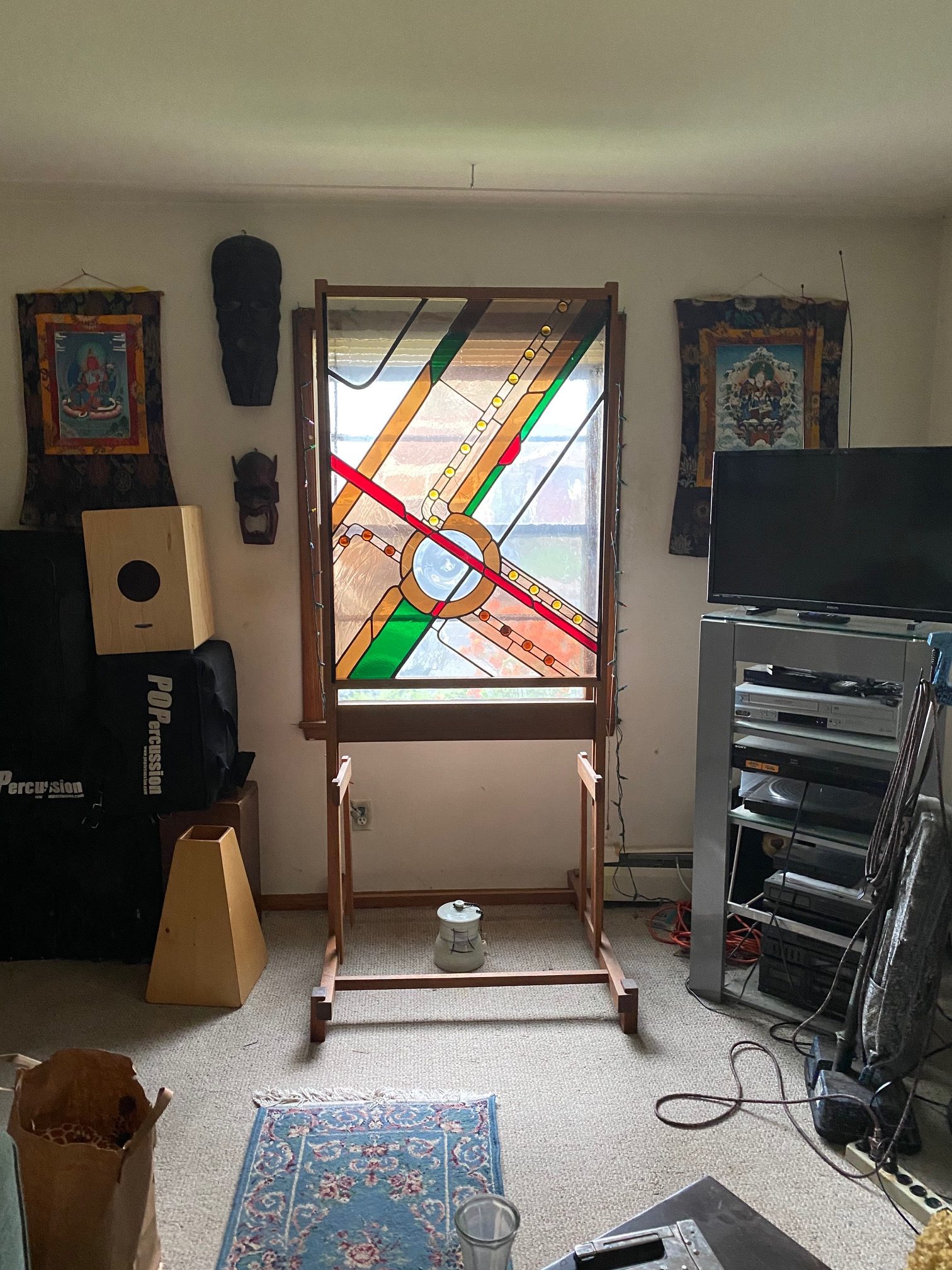
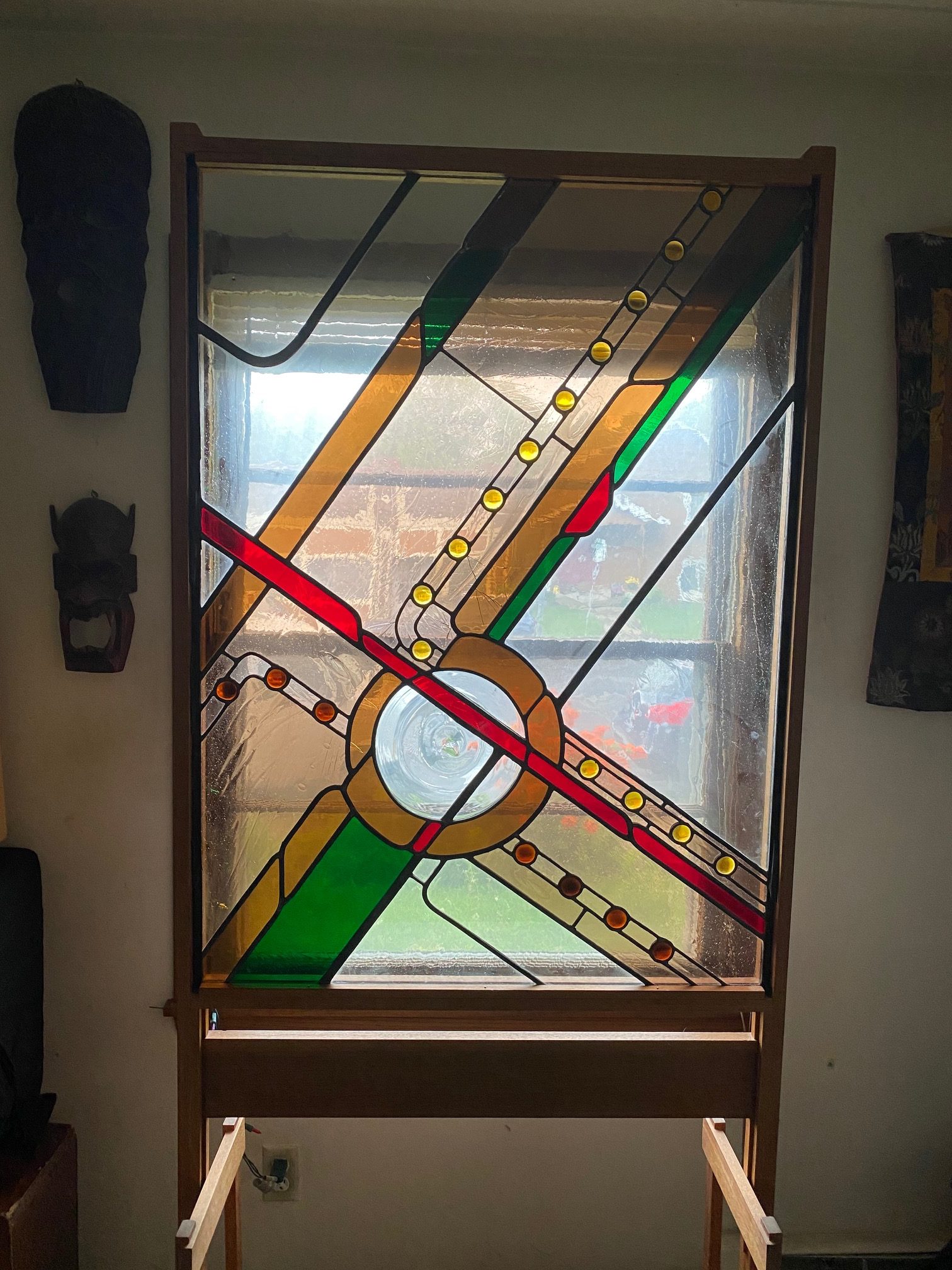
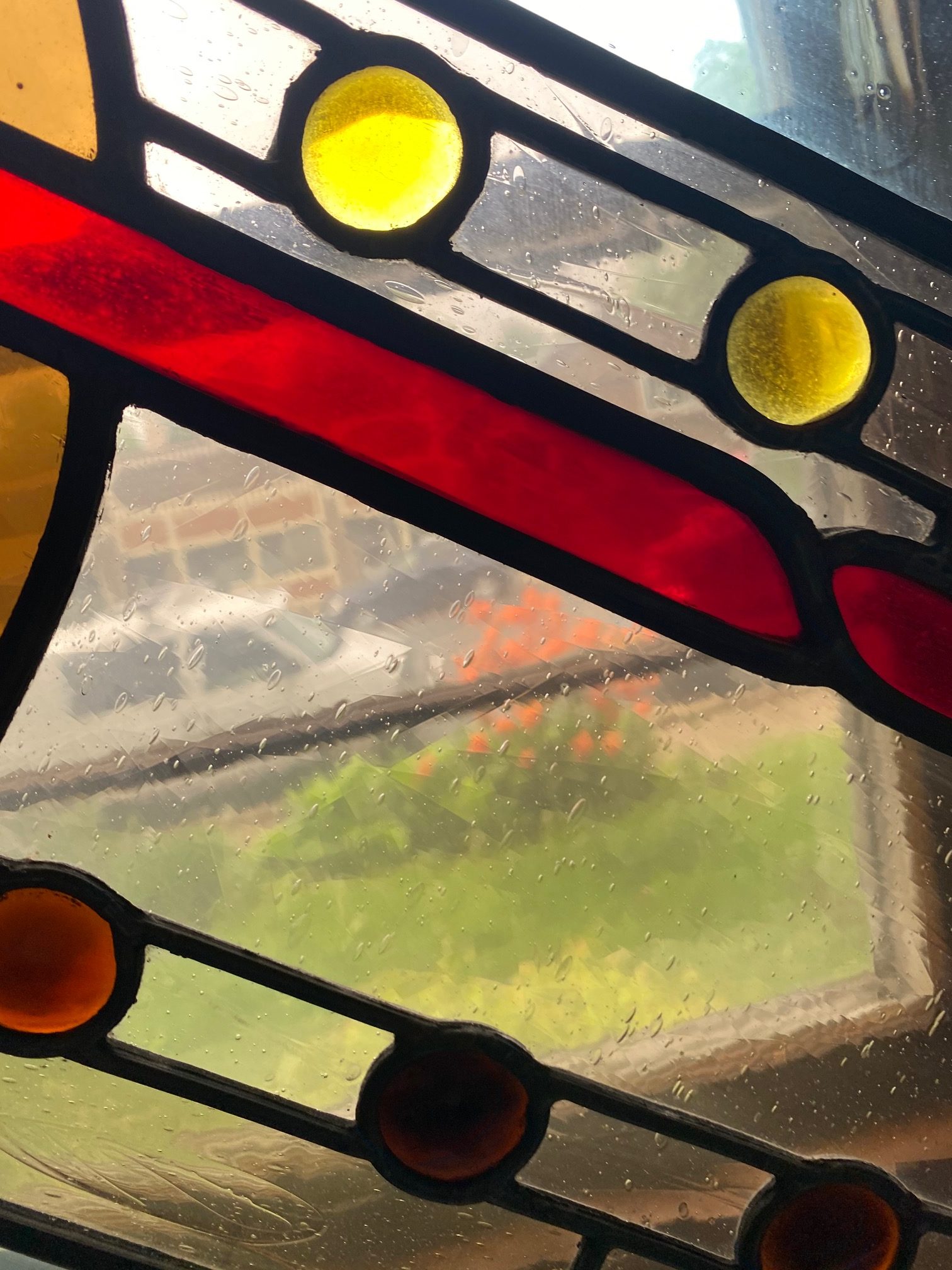
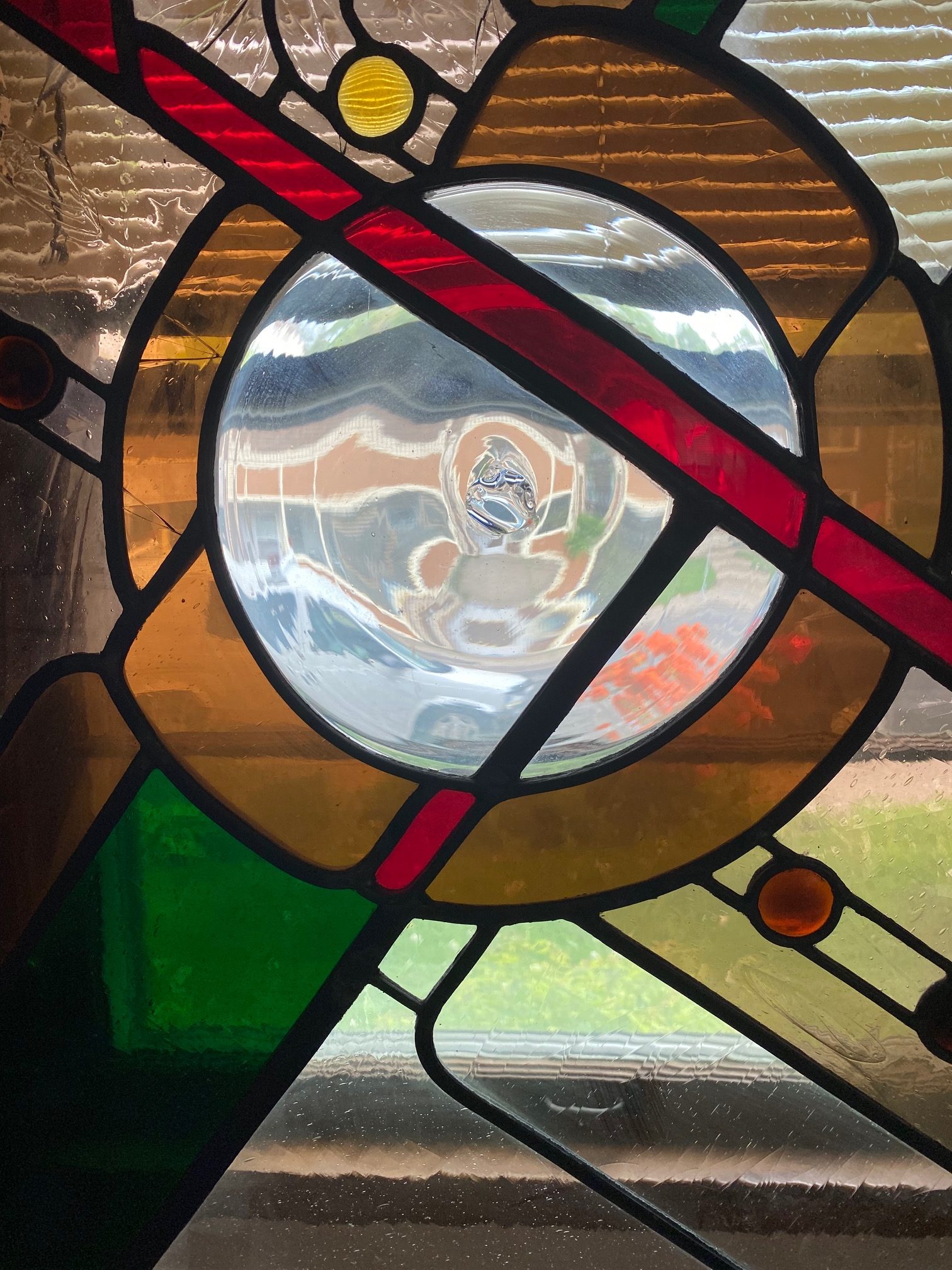
more...
Near the heart of the Virgo Galaxy Cluster the string of galaxies known as Markarian’s Chain stretches across this deep telescopic field of view. Anchored in the frame at bottom center by prominent lenticular galaxies, M84 (bottom) and M86, you can follow the chain up and to the right. Near center you’ll spot the pair of interacting galaxies NGC 4438 and NGC 4435, known to some as Markarian’s Eyes. Its center an estimated 50 million light-years distant, the Virgo Cluster itself is the nearest galaxy cluster. With up to about 2,000 member galaxies, it has a noticeable gravitational influence on our own Local Group of Galaxies. Within the Virgo Cluster at least seven galaxies in Markarian’s Chain appear to move coherently, although others may appear to be part of the chain by chance.
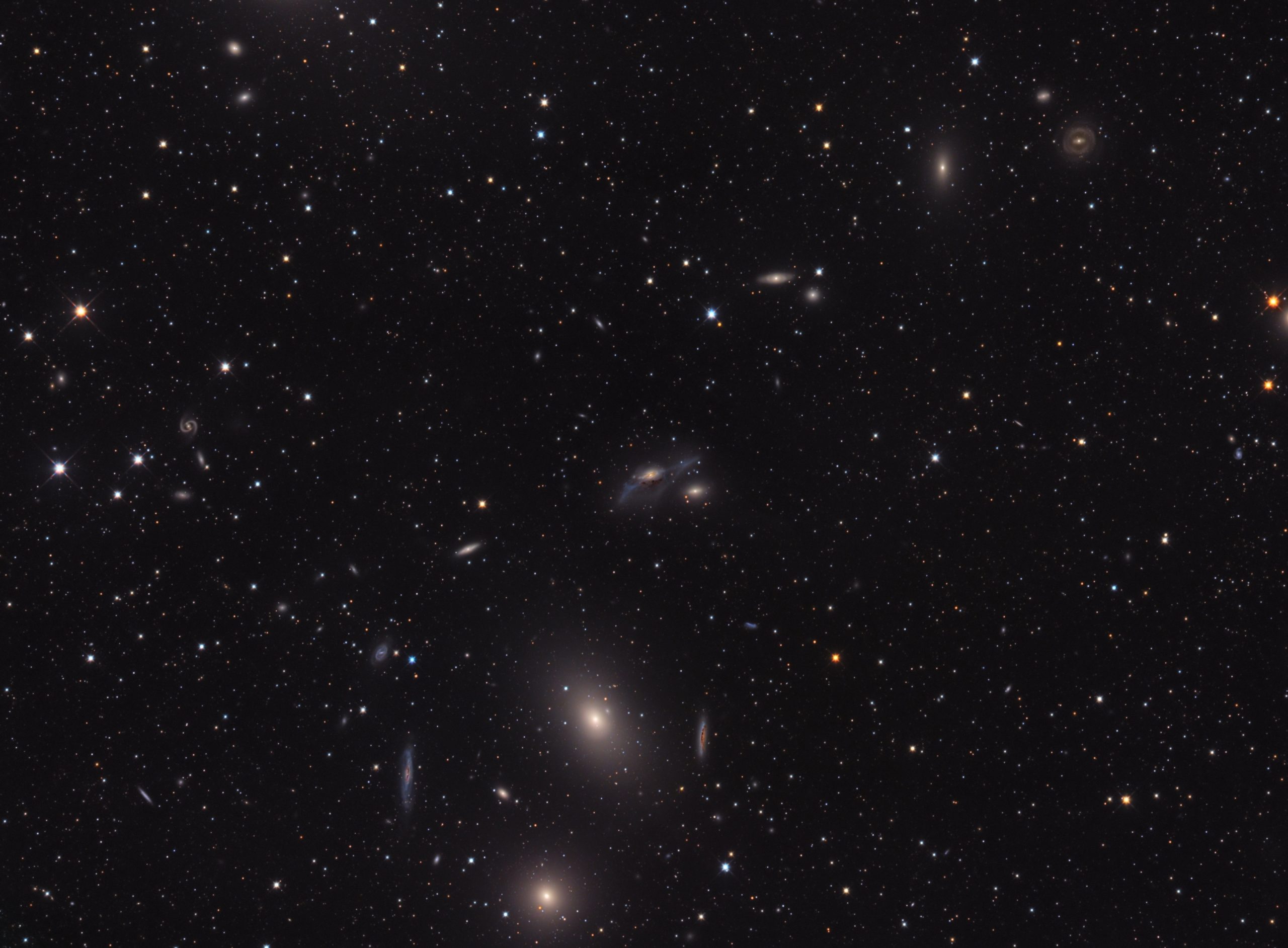
Ian Robertson Underwood (born May 22, 1939) is a woodwind and keyboards player, known for his work with Frank Zappa and the Mothers of Invention.
Underwood graduated from The Choate School in 1957 and Yale University with a bachelor’s degree in composition in 1961 and a master’s degree in composition at UC Berkeley in 1966. He began his career by playing San Francisco Bay Area coffeehouses and bars with his improvisational group, the Jazz Mice, in the mid 1960s before he became a member of Frank Zappa and the Mothers of Invention in 1967 for their third studio album, We’re Only in It for the Money. He speaks on Uncle Meat; on the track “Ian Underwood Whips It Out” he relates how he first met Zappa and demonstrated his capabilities on the saxophone at Zappa’s invitation. Underwood later worked with Frank Zappa on his solo recordings, including 1969’s Hot Rats. He married Ruth Komanoff (Underwood), marimbist/percussionist from the Mothers of Invention in May 1969. Underwood left the Mothers of Invention in September 1973. He and Ruth divorced in 1986.
After his lengthy career with Frank Zappa, he pursued a career as a session keyboardist. Underwood has since been proficient on the Minimoog synthesizer, mostly in film. He has been credited in recordings for Quincy Jones, Barbra Streisand, Ronee Blakley, Hugh Cornwell, Freddie Hubbard, Jean-Luc Ponty, Herb Alpert, Hugh Masekela, Peggy Lee, Dolly Parton, Chicago, Janet Jackson, Dave Grusin, Jefferson Airplane, Frankie Valli, the Carpenters, James Ingram, and Barry Manilow. Underwood was also one of the musicians who played the main title theme for the 1980s hit series Knight Rider. Underwood was the uncredited producer of the debut album by Alice Cooper, Pretties For You, in 1969.
more...Richard Alan Berk (May 22, 1939 – February 8, 2014) was an American jazz drummer and bandleader.
A native of San Francisco, California, he studied at the Berklee College of Music and played in the Boston area early in the 1960s. In 1962 he moved to New York City and played with Ted Curson and Bill Barron in a quintet from 1962 to 1964. Following this he played with Charles Mingus, Mose Allison, Freddie Hubbard, and Walter Bishop, Jr., among others. He moved to Los Angeles late in the 1960s, where he played with Milt Jackson, George Duke, Cal Tjader, Jean-Luc Ponty, and Blue Mitchell. He founded the Jazz Adoption Agency in the early 1980s, playing into the 2000s; the group included Andy Martin, Mike Fahn, Nick Brignola, Jon Nagorney, Keith Saunders, Tad Weed, and John Patitucci. He died in 2014 at the age of 74.
more...Le Sony’r Ra (born Herman Poole Blount, May 22, 1914 – May 30, 1993), better known as Sun Ra, was an American jazz composer, bandleader, piano and synthesizer player, and poet known for his experimental music, “cosmic” philosophy, prolific output, and theatrical performances. For much of his career, Ra led “The Arkestra,” an ensemble with an ever-changing name and flexible line-up.
Born and raised in Alabama, Blount became involved in the Chicago jazz scene during the late 1940s. He soon abandoned his birth name, taking the name Le Sony’r Ra, shortened to Sun Ra (after Ra, the Egyptian God of the Sun). Claiming to be an alien from Saturn on a mission to preach peace, he developed a mythical persona and an idiosyncratic credo that made him a pioneer of Afrofuturism.Throughout his life he denied ties to his prior identity saying, “Any name that I use other than Ra is a pseudonym.”
His widely eclectic and avant-garde music echoed the entire history of jazz, from ragtime and early New Orleans hot jazz, to swing music, bebop, free jazz and fusion. His compositions ranged from keyboard solos to works for big bands of over 30 musicians, along with electronic excursions, songs, chants, percussion pieces, and anthems. From the mid-1950s until his death, Ra led the musical collective The Arkestra (which featured artists such as Marshall Allen, John Gilmore and June Tyson throughout its various iterations). Its performances often included dancers and musicians dressed in elaborate, futuristic costumes inspired by ancient Egyptian attire and the Space Age. (Following Ra’s illness-forced retirement in 1992, the band remained active as The Sun Ra Arkestra, and, as of 2018, continues performing under the leadership of veteran Ra sideman Marshall Allen.) Though his mainstream success was limited, Sun Ra was a prolific recording artist and frequent live performer, and remained influential throughout his life for his music and persona. He is now widely considered an innovator; among his distinctions are his pioneering work in free improvisation and modal jazz and his early use of electronic keyboards and synthesizers. Over the course of his career, he recorded dozens of singles and over one hundred full-length albums, comprising well over 1,000 songs, making him one of the most prolific recording artists of the 20th century.
He was born Herman Blount on May 22, 1914, in Birmingham, Alabama, as discovered by his biographer, John F. Szwed, and published in his 1998 book. He was named after the popular vaudeville stage magician Black Herman, who had deeply impressed his mother. He was nicknamed “Sonny” from his childhood, had an older sister and half-brother, and was doted upon by his mother and grandmother.
For decades, very little was known about Sun Ra’s early life, and he contributed to its mystique. As a self-invented person, he routinely gave evasive, contradictory or seemingly nonsensical answers to personal questions, and denied his birth name. He speculated, only half in jest, that he was distantly related to Elijah Poole, later known as Elijah Muhammad, leader of the Nation of Islam. His birthday for years remained unknown, as his claims ranged from 1910 to 1918. Only a few years before his death, the date of Sun Ra’s birth was still a mystery. Jim Macnie’s notes for Blue Delight (1989) said that Sun Ra was believed to be about 75 years old. But Szwed was able to uncover a wealth of information about his early life and confirmed a birth date of May 22, 1914. As a child, Blount was a skilled pianist. By the age of 11 or 12, he was composing and sight reading music. Birmingham was an important stop for touring musicians and he saw prominent musicians such as Fletcher Henderson, Duke Ellington, and Fats Waller, and others now forgotten. Sun Ra once said, “The world let down a lot of good musicians”.
In his teenage years, Blount demonstrated prodigious musical talent: many times, according to acquaintances, he went to big band performances and then produced full transcriptions of the bands’ songs from memory. By his mid-teens, Blount was performing semi-professionally as a solo pianist, or as a member of various ad hoc jazz and R&B groups. He attended Birmingham’s segregated Industrial High School (now known as Parker High School), where he studied under music teacher John T. “Fess” Whatley, a demanding disciplinarian who was widely respected and whose classes produced many professional musicians. Though deeply religious, his family was not formally associated with any Christian church or sect. Blount had few or no close friends in high school but was remembered as kind-natured and quiet, an honor roll student, and a voracious reader. He took advantage of the Black Masonic Lodge as one of the few places in Birmingham where African Americans had unlimited access to books. Its collection on Freemasonry and other esoteric concepts made a strong impression on him. By his teens, Blount suffered from cryptorchidism. It left him with a nearly constant discomfort that sometimes flared into severe pain. Szwed suggests that Blount felt shame about it and the condition contributed to his isolation.
more...This packed ESA/Hubble Picture of the Week showcases the galaxy cluster ACO S 295, as well as a jostling crowd of background galaxies and foreground stars. Galaxies of all shapes and sizes populate this image, ranging from stately spirals to fuzzy ellipticals. As well as a range of sizes, this galactic menagerie boasts a range of orientations, with spiral galaxies such as the one at the centre of this image appearing almost face on, and some edge-on spiral galaxies visible only as thin slivers of light. The cluster dominates the centre of this image, both visually and physically. The huge mass of the galaxy cluster has gravitationally lensed the background galaxies, distorting and smearing their shapes. As well as providing astronomers with a natural magnifying glass with which to study distant galaxies, gravitational lensing has subtly framed the centre of this image, producing a visually striking scene.

Larance Norman Marable (May 21, 1929 – July 4, 2012) was a jazz drummer from Los Angeles, California.
Marable was born in Los Angeles on May 21, 1929. His family was musical, but he was largely self-taught.
In the 1950s, Marable played with musicians who were visiting Los Angeles; these included Dexter Gordon, Charlie Parker, and Zoot Sims. Marable recorded as a leader in 1956. He also recorded with George Shearing, Chet Baker, Milt Jackson, and other well-known musicians.
Drug problems led to Marable stopping playing in the 1960s. His career resumed in the mid-1970s, after he had ended his drug addiction. He toured with Supersax and Bobby Hutcherson in the 1970s, and was a member of Charlie Haden‘s Quartet West in the 1980s and 1990s.
Marable had a stroke in the 2000s and lived in a health care facility. He died in Manhattan on July 4, 2012.
https://www.youtube.com/watch?v=LW63MKyhSa4
more...Thomas Wright “Fats” Waller (May 21, 1904 – December 15, 1943) was an American jazz pianist, organist, composer, violinist, singer, and comedic entertainer. His innovations in the Harlem stride style laid the groundwork for modern jazz piano. His best-known compositions, “Ain’t Misbehavin’” and “Honeysuckle Rose“, were inducted into the Grammy Hall of Fame in 1984 and 1999. Waller copyrighted over 400 songs, many of them co-written with his closest collaborator, Andy Razaf. Razaf described his partner as “the soul of melody… a man who made the piano sing… both big in body and in mind… known for his generosity… a bubbling bundle of joy”. It is possible financial circumstances caused him to compose many more popular songs and sell them to other performers.
Waller started playing the piano at the age of six, and became a professional organist at age 15. By the age of 18, he was a recording artist. Waller’s first recordings, “Muscle Shoals Blues” and “Birmingham Blues”, were made in October 1922 for Okeh Records. That year, he also made his first player piano roll, “Got to Cool My Doggies Now”. Waller’s first published composition, “Squeeze Me“, was published in 1924. He became one of the most popular performers of his era, touring internationally and achieving critical and commercial success in the United States and Europe. He died from pneumonia, aged 39.
Waller was the seventh child of 11 (five of whom survived childhood) born to Adeline Locket Waller, a musician, and Reverend Edward Martin Waller, a trucker and pastor in New York City. He started playing the piano when he was six and graduated to playing the organ at his father’s church four years later. His mother instructed him in his youth, and he attended other music lessons, paying for them by working in a grocery store. Waller attended DeWitt Clinton High School for one semester, but left school at 15 to work as an organist at the Lincoln Theater in Harlem, where he earned $32 a week. Within 12 months he had composed his first rag. He was the prize pupil and later the friend and colleague of the stride pianist James P. Johnson. His mother died on November 10, 1920 from a stroke due to diabetes. Waller contracted pneumonia and died on December 15, 1943, while traveling aboard the famous cross-country Los Angeles–Chicago train the Super Chief near Kansas City, Missouri. His final recording session was with an interracial group in Detroit, Michigan, that included white trumpeter Don Hirleman. Waller was returning to New York City from Los Angeles, after the smash success of Stormy Weather, and after a successful engagement at the Zanzibar Room in Santa Monica, California, during which he had fallen ill.[29]:6 More than 4,200 people were estimated to have attended his funeral at Abyssinian Baptist Church in Harlem.
more...Tientos is a flamenco Andalusian palo which has a rhythm consisting of 4 beats. It is in the same family as the Tangos, but slower and with different topics, lyrics and mood. Every Tientos becomes a Tangos at the end of the song/dance. Traditionally, cantaor El Marrurro (1848 -1906) has been considered one of the creators of this style. Enrique el Mellizo gave it the modern form by which we know it today. Other famous cantaores who interpreted this style were Antonio Chacón and Pastora Pavón.
Like many Cante Jondo, traditional Tientos lyrics (letras) tend to be pathetic, sentimental, and speak about the lack of love, disillusionment and revenge. Dancers strive to capture this mood in their solos. It can be danced by a man or a woman.
The structure is similar to most Flamenco dances and can be broken down as follows:
- Guitar intro
- Song intro
- Footwork intro and llamada
- First letra, punctuated by a footwork during the respiro ‑ a break in the song after the second line of letra
- Guitar falsetta
- Escobilla (footwork section)
- Second letra
- Second escobilla
- Subida
- Macho or Tangos to close
More Posts
- The Cosmos with NGC 6872 & IC 4970
- Paul McCartney Day
- William Hooker Day
- Rudy Rutherford Day
- World Fusion with Manika Kaur
- Daily Roots with the Congos
- Happy Fathers Day 2018
- The Cosmos with RCW 108
- Chuck Rainey Day
- Sing Miller Day
- World Music with Corvus Corax
- Daily Roots with ITSJAHMIEL
- The Cosmos with NGC 3372
- Lucky Thompson Day
- World Music with Sherrifo Konteh
- Daily Roots with Culture
- The Cosmos with NGC 3190
- Jaki Byard Day
- Erroll Garner Day